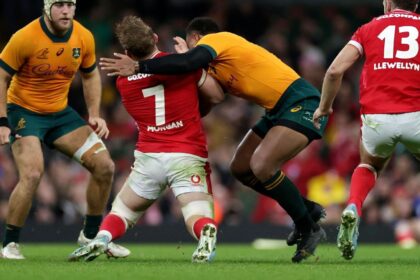When talking about Meg Jones, the responses about her, both as a person and a rugby player, are overwhelmingly positive.
Before the World Cup final against Canada, coach John Mitchell highlighted her incredible energy, which she transmits to her teammates. Captain Zoe Aldcroft did not hesitate to call her the best player in the world and an “incredible person”.
As a player, Jones has been exceptional since the first match of the World Cup against the United States. Her efforts, both in this tournament and in the Six Nations, have earned her a nomination for the World Rugby Player of the Year award.
Even, it could be argued that the Red Roses are built around it.
Both his mother, Paula, and his father, Simon, passed away within months of each other last year. When asked how challenging it has all been, Jones’s answer says it all. “Yes, of course it’s difficult, but… I hate being the victim,” says Jones. “I was never raised that way. My mother and father would have been disgusted by that, so I would never sit around asking for pity or sympathy, and sometimes it has cost me to give sympathy, probably because of the way I think.” “I never want people to feel sorry for me.”“I don’t want people to feel sorry for me”.
Meg Jones

She has spoken openly about her parents to show the importance of being vulnerable and talking about difficult times. Jones wants to show others that even the strongest rugby players go through difficult times. But if talking about it can lighten the load, it’s worth it.
“I’m not saying there are never bad days, of course there are many bad days, but there’s always something good within a bad day,” Jones reflects. “I think perspective is a very beautiful thing and it’s everything my parents taught me… Work hard and always know that you’ll never feel sad 24 hours a day, 7 days a week.” That mentality is shown in the way Jones plays. If things don’t go as he wants, he doesn’t argue with the referee or raise his hands in the air. He simply moves on to the next task and how he can master it. It’s been that way since she picked up a rugby ball for the first time at the age of six, playing with the boys as the only girl on her team until she was a teenager. Jones was, in her own words, a tough girl and eager for contact. She was reprimanded while playing hockey for being too physical, having to be reminded that it’s not really a contact sport. Jones and his brothers used to fight: “It wasn’t like WWE, but it was pretty tough,” Jones recalls.







